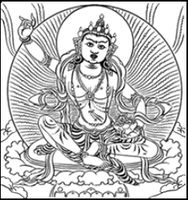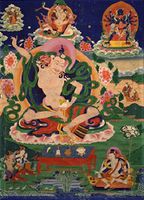Śrīsiṃha
| PersonType | Category:Classical Indian Authors |
|---|---|
| MainNameTib | དཔལ་གྱི་སེངྒེ་ |
| MainNameWylie | dpal gyi seng+ge |
| MainNameSkt | Śrīsiṃha |
| AltNamesTib | ཤྲཱི་སིངྷ་ · ཤྲཱི་སིཾ་ཧ་ |
| AltNamesWylie | shrI sing+ha · shrI siM ha |
| bio | Shri Singha was the chief disciple and successor of Manjushrimitra in the lineage of the Dzogchen teachings. He was born in the Chinese city of Shokyam in Khotan and studied at first with the Chinese masters Hatibhala and Bhelakirti. In his Ocean of Wondrous Sayings, Guru Tashi Tobgyal adds that Shri Singha received a prophesy from Avalokiteshvara while traveling to Serling, telling him to go to the Sosaling charnel ground in order to be sure of the ultimate attainment. After many years Shri Singha met Manjushrimitra in the charnel ground of Sosaling, and remained with him for twenty-five years. Having transmitted all the oral instructions, the great master Manjushrimitra dissolved his bodily form into a mass of light. When Shri Singha cried out in despair and uttered songs of deep yearning, Manjushrimitra appeared again and bestowed him a tiny casket of precious substance. The casket contained his master's final words, a vital instruction named Gomnyam Drugpa, the Six Experiences of Meditation. Having received this transmission, Shri Singha reached ultimate confidence. In Bodhgaya he found the manuscripts of the tantras previously hidden by Manjushrimitra which he took to China where he classified the Instruction Section into four parts: the outer, inner, secret, and the innermost unexcelled sections. Among Shri Singha's disciples were four outstanding masters: Jnanasutra, Vimalamitra, Padmasambhava and the Tibetan translator Vairotsana. (Source: RY wiki) |
| StudentOf | Buddhaguhya · Mañjuśrīmitra |
| TeacherOf | Vairotsana · Padmasambhava · Vimalamitra |
| BDRC | https://www.tbrc.org/#!rid=P10718 |
| IsInGyatsa | No |
| Other wikis |
If the page does not yet exist on the remote wiki, you can paste the tag |



